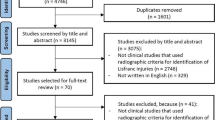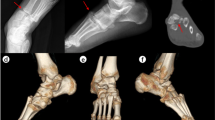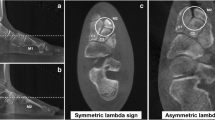Abstract
Objectives
To systematically review current diagnostic imaging options for assessment of the Lisfranc joint.
Materials and methods
PubMed and ScienceDirect were systematically searched. Thirty articles were subdivided by imaging modality: conventional radiography (17 articles), ultrasonography (six articles), computed tomography (CT) (four articles), and magnetic resonance imaging (MRI) (11 articles). Some articles discussed multiple modalities. The following data were extracted: imaging modality, measurement methods, participant number, sensitivity, specificity, and measurement technique accuracy. Methodological quality was assessed by the QUADAS-2 tool.
Results
Conventional radiography commonly assesses Lisfranc injuries by evaluating the distance between either the first and second metatarsal base (M1-M2) or the medial cuneiform and second metatarsal base (C1-M2) and the congruence between each metatarsal base and its connecting tarsal bone. For ultrasonography, C1-M2 distance and dorsal Lisfranc ligament (DLL) length and thickness are evaluated. CT clarifies tarsometatarsal (TMT) joint alignment and occult fractures obscured on radiographs. Most MRI studies assessed Lisfranc ligament integrity. Overall, included studies show low bias for all domains except patient selection and are applicable to daily practice.
Conclusions
While conventional radiography can demonstrate frank diastasis at the TMT joints; applying weightbearing can improve the viewer’s capacity to detect subtle Lisfranc injury by radiography. Although ultrasonography can evaluate the DLL, its accuracy for diagnosing Lisfranc instability remains unproven. CT is more beneficial than radiography for detecting non-displaced fractures and minimal osseous subluxation. MRI is clearly the best for detecting ligament abnormalities; however, its utility for detecting subtle Lisfranc instability needs further investigation. Overall, the available studies’ methodological quality was satisfactory.








Similar content being viewed by others
Change history
27 December 2019
Unfortunately in Volume 49, Issue 1 had been published online with an incorrect date (2001 instead of 2020).
References
Cassebaum WH. Lisfranc fracture-dislocations. Clin Orthop Relat Res. 1963;30:116–29.
Solan MC, Moorman CT 3rd, Miyamoto RG, Jasper LE, Belkoff SM. Ligamentous restraints of the second tarsometatarsal joint: a biomechanical evaluation. Foot Ankle Int. 2001;22(8):637–41.
DeOrio M, Erickson M, Usuelli FG, Easley M. Lisfranc injuries in sport. Foot Ankle Clin. 2009;14(2):169–86.
Myerson MS, Cerrato R. Current management of tarsometatarsal injuries in the athlete. Instr Course Lect. 2009;58:583–94.
McHale KJ, Vopat BG, Beaulieu-Jones BR, Sanchez G, Whalen JM, McDonald LS, et al. Epidemiology and outcomes of Lisfranc injuries identified at the National Football League Scouting Combine. Am J Sports Med. 2017;45(8):1901–8.
Porter DA, Barnes AF, Rund A, Walrod MT. Injury pattern in ligamentous Lisfranc injuries in competitive athletes. Foot Ankle Int. 2018;40(2):185–94.
Norfray JF, Geline RA, Steinberg RI, Galinski AW, Gilula LA. Subtleties of Lisfranc fracture-dislocations. AJR Am J Roentgenol. 1981;137(6):1151–6.
Sherief TI, Mucci B, Greiss M. Lisfranc injury: how frequently does it get missed? And how can we improve? Injury. 2007;38(7):856–60.
Wei CJ, Tsai WC, Tiu CM, Wu HT, Chiou HJ, Chang CY. Systematic analysis of missed extremity fractures in emergency radiology. Acta Radiol. 2006;47(7):710–7.
Groulier P, Pinaud JC. Tarso-metatarsal dislocations (10 cases). Rev Chir Orthop Reparatrice Appar Mot. 1970;56(4):303–24.
Philbin T, Rosenberg G, Sferra JJ. Complications of missed or untreated Lisfranc injuries. Foot Ankle Clin. 2003;8(1):61–71.
Raikin SM, Elias I, Dheer S, Besser MP, Morrison WB, Zoga AC. Prediction of midfoot instability in the subtle Lisfranc injury. Comparison of magnetic resonance imaging with intraoperative findings. J Bone Joint Surg Am. 2009;91(4):892–9.
Foster SC, Foster RR. Lisfranc's tarsometatarsal fracture-dislocation. Radiology. 1976;120(1):79–83.
Faciszewski T, Burks RT, Manaster BJ. Subtle injuries of the Lisfranc joint. J Bone Joint Surg Am. 1990;72(10):1519–22.
Nunley JA, Vertullo CJ. Classification, investigation, and management of midfoot sprains: Lisfranc injuries in the athlete. Am J Sports Med. 2002;30(6):871–8.
Seo DK, Lee HS, Lee KW, Lee SK, Kim SB. Nonweightbearing radiographs in patients with a subtle Lisfranc injury. Foot Ankle Int. 2017;38(10):1120–5.
Woodward S, Jacobson JA, Femino JE, Morag Y, Fessell DP, Dong Q. Sonographic evaluation of Lisfranc ligament injuries. J Ultrasound Med. 2009;28(3):351–7.
Graves NC, Rettedal DD, Marshall JJ, Frush K, Vardaxis V. Ultrasound assessment of dorsal Lisfranc ligament strain under clinically relevant loads. J Am Podiatr Med Assoc. 2014;104(1):11–8.
Marshall JJ, Graves NC, Rettedal DD, Frush K, Vardaxis V. Ultrasound assessment of bilateral symmetry in dorsal Lisfranc ligament. J Foot Ankle Surg. 2013;52(3):319–23.
Rettedal DD, Graves NC, Marshall JJ, Frush K, Vardaxis V. Reliability of ultrasound imaging in the assessment of the dorsal Lisfranc ligament. J Foot Ankle Res. 2013;6(1):7.
Ryba D, Ibrahim N, Choi J, Vardaxis V. Evaluation of dorsal Lisfranc ligament deformation with load using ultrasound imaging. Foot (Edinb). 2016;26:30–5.
Lu J, Ebraheim NA, Skie M, Porshinsky B, Yeasting RA. Radiographic and computed tomographic evaluation of Lisfranc dislocation: a cadaver study. Foot Ankle Int. 1997;18(6):351–5.
Haapamaki V, Kiuru M, Koskinen S. Lisfranc fracture-dislocation in patients with multiple trauma: diagnosis with multidetector computed tomography. Foot Ankle Int. 2004;25(9):614–9.
Rankine JJ, Nicholas CM, Wells G, Barron DA. The diagnostic accuracy of radiographs in Lisfranc injury and the potential value of a craniocaudal projection. AJR Am J Roentgenol. 2012;198(4):W365–9.
Preidler KW, Brossmann J, Daenen B, Goodwin D, Schweitzer M, Resnick D. MR imaging of the tarsometatarsal joint: analysis of injuries in 11 patients. AJR Am J Roentgenol. 1996;167(5):1217–22.
Preidler KW, Wang YC, Brossmann J, Trudell D, Daenen B, Resnick D. Tarsometatarsal joint: anatomic details on MR images. Radiology. 1996;199(3):733–6.
Delfaut EM, Rosenberg ZS, Demondion X. Malalignment at the Lisfranc joint: MR features in asymptomatic patients and cadaveric specimens. Skelet Radiol. 2002;31(9):499–504.
Macmahon PJ, Dheer S, Raikin SM, Elias I, Morrison WB, Kavanagh EC, et al. MRI of injuries to the first interosseous cuneometatarsal (Lisfranc) ligament. Skelet Radiol. 2009;38(3):255–60.
Castro M, Melao L, Canella C, Weber M, Negrao P, Trudell D, et al. Lisfranc joint ligamentous complex: MRI with anatomic correlation in cadavers. AJR Am J Roentgenol. 2010;195(6):W447–55.
Siddiqui NA, Galizia MS, Almusa E, Omar IM. Evaluation of the tarsometatarsal joint using conventional radiography, CT, and MR imaging. Radiographics. 2014;34(2):514–31.
Whiting PF, Rutjes AW, Westwood ME, Mallett S, Deeks JJ, Reitsma JB, et al. QUADAS-2: a revised tool for the quality assessment of diagnostic accuracy studies. Ann Intern Med. 2011;155(8):529–36.
McInnes MDF, Moher D, Thombs BD, McGrath TA, Bossuyt PM, the P-DTAG, et al. Preferred reporting items for a systematic review and meta-analysis of diagnostic test accuracy studies: the PRISMA-DTA statement. JAMA. 2018;319(4):388–96.
Yu-Kai Y, Shiu-Bii L. Anatomic parameters of the Lisfranc joint complex in a radiographic and cadaveric comparison. J Foot Ankle Surg. 2015;54(5):883–7.
Kitsukawa K, Hirano T, Niki H, Tachizawa N, Nakajima Y, Hirata K. MR imaging evaluation of the Lisfranc ligament in cadaveric feet and patients with acute to chronic Lisfranc injury. Foot Ankle Int. 2015;36(12):1483–92.
Coss HS, Manos RE, Buoncristiani A, Mills WJ. Abduction stress and AP weightbearing radiography of purely ligamentous injury in the tarsometatarsal joint. Foot Ankle Int. 1998;19(8):537–41.
Potter HG, Deland JT, Gusmer PB, Carson E, Warren RF. Magnetic resonance imaging of the Lisfranc ligament of the foot. Foot Ankle Int. 1998;19(7):438–46.
Shapiro MS, Wascher DC, Finerman GA. Rupture of Lisfranc’s ligament in athletes. Am J Sports Med. 1994;22(5):687–91.
Knijnenberg LM, Dingemans SA, Terra MP, Struijs PAA, Schep NWL, Schepers T. Radiographic anatomy of the pediatric Lisfranc joint. J Pediatr Orthop. 2018;38(10):510–3.
Kaicker J, Zajac M, Shergill R, Choudur HN. Ultrasound appearance of the normal Lisfranc ligament. Emerg Radiol. 2016;23(6):609–14.
Preidler KW, Peicha G, Lajtai G, Seibert FJ, Fock C, Szolar DM, et al. Conventional radiography, CT, and MR imaging in patients with hyperflexion injuries of the foot: diagnostic accuracy in the detection of bony and ligamentous changes. AJR Am J Roentgenol. 1999;173(6):1673–7.
Ulbrich EJ, Zubler V, Sutter R, Espinosa N, Pfirrmann CW, Zanetti M. Ligaments of the Lisfranc joint in MRI: 3D-SPACE (sampling perfection with application optimized contrasts using different flip-angle evolution) sequence compared to three orthogonal proton-density fat-saturated (PD fs) sequences. Skelet Radiol. 2013;42(3):399–409.
Watson TS, Shurnas PS, Denker J. Treatment of Lisfranc joint injury: current concepts. J Am Acad Orthop Surg. 2010;18(12):718–28.
Benirschke SK, Meinberg E, Anderson SA, Jones CB, Cole PA. Fractures and dislocations of the midfoot: Lisfranc and Chopart injuries. J Bone Joint Surg Am. 2012;94(14):1325–37.
Bancroft LW, Kransdorf MJ, Adler R, Appel M, Beaman FD, Bernard SA, et al. ACR appropriateness criteria acute trauma to the foot. J Am Coll Radiol. 2015;12(6):575–81.
Goiney RC, Connell DG, Nichols DM. CT evaluation of tarsometatarsal fracture-dislocation injuries. AJR Am J Roentgenol. 1985;144(5):985–90.
Kalia V, Fishman EK, Carrino JA, Fayad LM. Epidemiology, imaging, and treatment of Lisfranc fracture-dislocations revisited. Skelet Radiol. 2012;41(2):129–36.
Chan BY, Markhardt BK, Williams KL, Kanarek AA, Ross AB. Os conundrum: identifying symptomatic sesamoids and accessory ossicles of the foot. AJR Am J Roentgenol. 2019:1–10.
Weatherford BM, Anderson JG, Bohay DR. Management of tarsometatarsal joint injuries. J Am Acad Orthop Surg. 2017;25(7):469–79.
Barg A, Bailey T, Richter M, de Cesar Netto C, Lintz F, Burssens A, et al. Weightbearing computed tomography of the foot and ankle: emerging technology topical review. Foot Ankle Int. 2018;39(3):376–86.
Haidich AB. Meta-analysis in medical research. Hippokratia. 2010;14(Suppl 1):29–37.
Author information
Authors and Affiliations
Corresponding author
Ethics declarations
Conflict of interest
The authors have no conflicts of interest to declare.
Additional information
Publisher’s note
Springer Nature remains neutral with regard to jurisdictional claims in published maps and institutional affiliations.
Rights and permissions
About this article
Cite this article
Sripanich, Y., Weinberg, M.W., Krähenbühl, N. et al. Imaging in Lisfranc injury: a systematic literature review. Skeletal Radiol 49, 31–53 (2020). https://doi.org/10.1007/s00256-019-03282-1
Received:
Revised:
Accepted:
Published:
Issue Date:
DOI: https://doi.org/10.1007/s00256-019-03282-1




